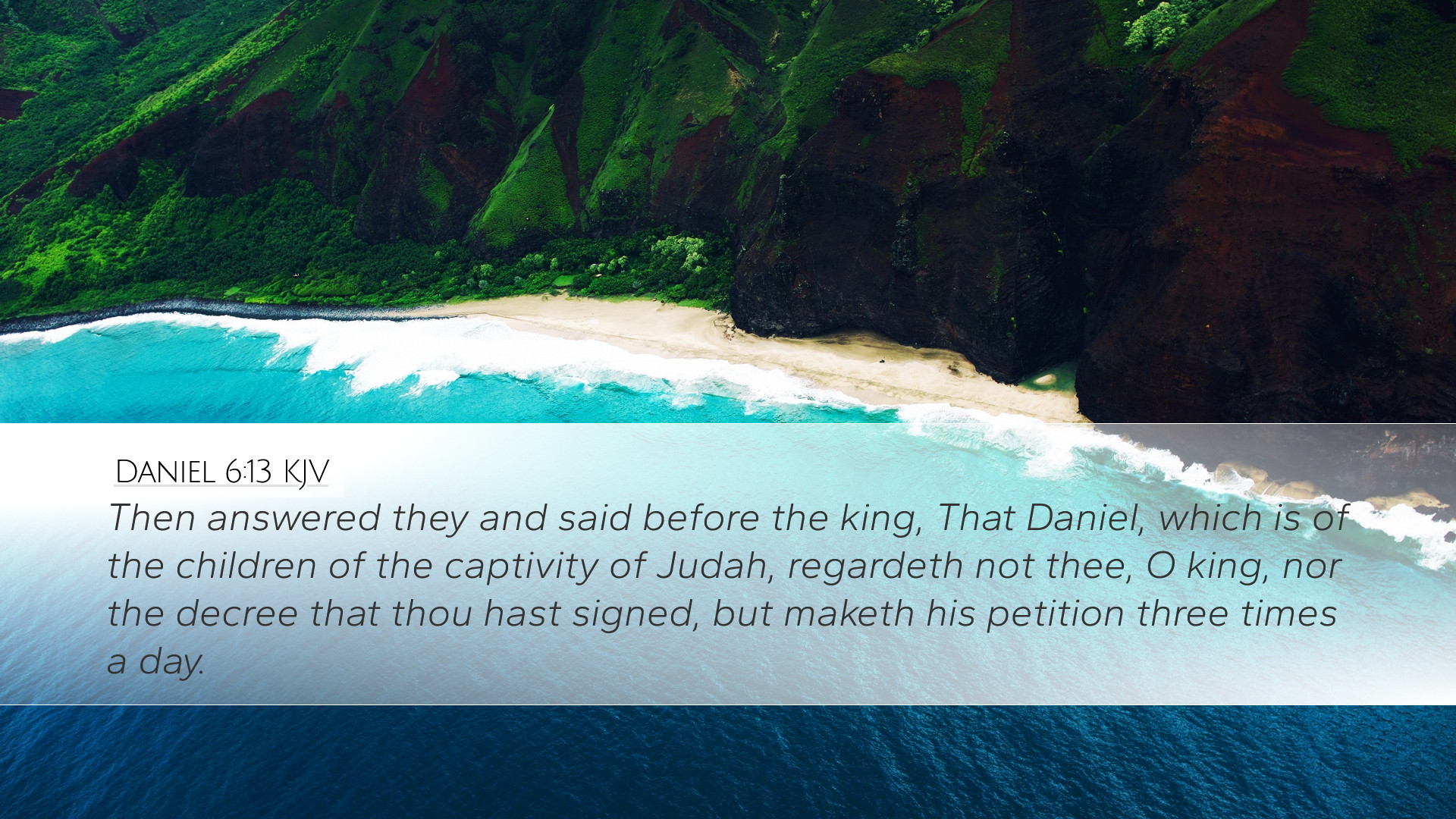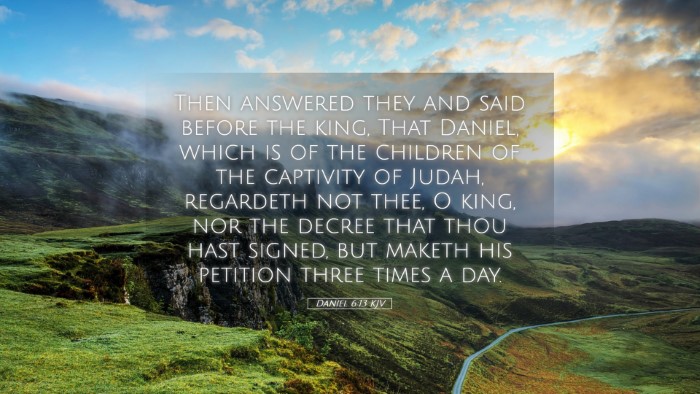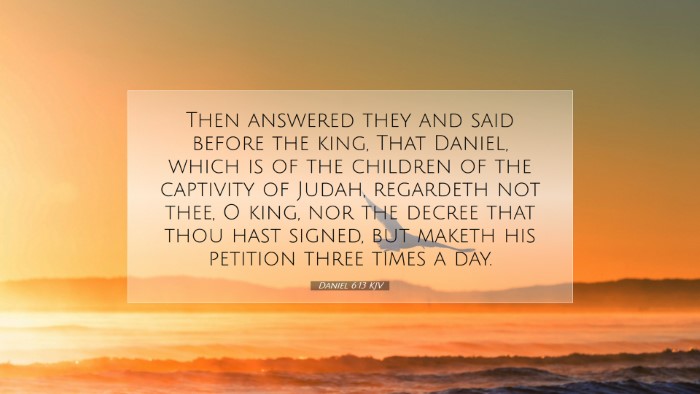Old Testament
Genesis Exodus Leviticus Numbers Deuteronomy Joshua Judges Ruth 1 Samuel 2 Samuel 1 Kings 2 Kings 1 Chronicles 2 Chronicles Ezra Nehemiah Esther Job Psalms Proverbs Ecclesiastes Song of Solomon Isaiah Jeremiah Lamentations Ezekiel Daniel Hosea Joel Amos Obadiah Jonah Micah Nahum Habakkuk Zephaniah Haggai Zechariah MalachiVerse
Daniel 6:1 Daniel 6:2 Daniel 6:3 Daniel 6:4 Daniel 6:5 Daniel 6:6 Daniel 6:7 Daniel 6:8 Daniel 6:9 Daniel 6:10 Daniel 6:11 Daniel 6:12 Daniel 6:13 Daniel 6:14 Daniel 6:15 Daniel 6:16 Daniel 6:17 Daniel 6:18 Daniel 6:19 Daniel 6:20 Daniel 6:21 Daniel 6:22 Daniel 6:23 Daniel 6:24 Daniel 6:25 Daniel 6:26 Daniel 6:27 Daniel 6:28


Commentary on Daniel 6:13
Verse: Daniel 6:13 - "Then answered they and said before the king, That Daniel, which is of the children of the captivity of Judah, regardeth not thee, O king, nor the decree that thou hast signed, but maketh his petition three times a day."
This verse occurs in the context of an attempt by rivals of Daniel to undermine his position in the Babylonian administration. Their intentions were driven by jealousy and a desire to remove a capable leader who served faithfully and earnestly. The commentaries from public domain sources like Matthew Henry, Albert Barnes, and Adam Clarke shed light on several profound insights regarding this passage.
Contextual Analysis
The political environment of Babylon during the time of Daniel was characterized by intrigue and competition among various leaders and officials. Daniel, being a Hebrew captive, had risen to a high position due to his exceptional capabilities and wisdom, given to him by God. The administrators who conspired against him were aware of his steadfast commitment to prayer, which became the foundation of their plot against him.
Insights from Matthew Henry
1. The Nature of the Accusation: Matthew Henry emphasizes the audacity and treachery of the accusers. They did not bring forth any legitimate wrongdoing on Daniel’s part; instead, they exploited his loyalty to God as a weakness. This reflects the spiritual warfare that occurs when a believer stands firm in their faith, often facing opposition from those who do not share the same convictions.
2. Daniel's Unyielding Faith: Henry points out that Daniel’s practice of prayer thrice daily is indicative of his steadfast relationship with God. It was not merely routine but a deep-rooted necessity for his spiritual life. This serves as an encouragement for believers to integrate prayer into their daily lives consistently, even in the face of potential persecution.
Insights from Albert Barnes
1. The Political Maneuvering: Albert Barnes discusses how the conspirators manipulated the king's decree to entrap Daniel. He outlines the importance of discernment in leadership and warns against the influence of flattery and ego. A leader must be attentive to the motives of those around them, especially in positions of power.
2. Daniel's Response to the Decree: Barnes notes that Daniel continued his practice of prayer undaunted, reflecting his unwavering devotion to God over that of earthly rulers. His decision to pray despite the decree demonstrates profound courage and commitment, establishing a model for believers facing similar trials. It raises the question of where one's ultimate allegiance lies—in God or in the dictates of man.
Insights from Adam Clarke
1. Historical Context: Adam Clarke provides historical insights into the Babylonian context, explaining the implications of being a captive and how Daniel’s actions created animosity among the Medo-Persian officials. Understanding the socio-political backdrop adds depth to the narrative, emphasizing that Daniel’s plight was a direct consequence of his extraordinary virtue.
2. The Spiritual Significance of Prayer: Clarke highlights the significance of Daniel’s thrice-daily prayers as symbolic of constant communion with God. It suggests that spiritual diligence is crucial, especially in challenging times. Clarke advocates for a prayer life that is both persistent and unwavering, noting that Daniel's actions provide an essential model for Christians today.
Theological Implications
This verse invites deeper theological contemplation regarding the relationship between faith and obedience to secular authority. It challenges believers to evaluate their priorities and prompts the question of how far one should go in obeying human laws when they conflict with divine commandments.
Conclusion
Daniel 6:13 serves as a powerful reminder of the importance of faithfulness to God in a world that may oppose or ridicule such commitment. The insights from public domain commentaries highlight the essence of Daniel’s character, his unyielding resolve in prayer, and the consequences of living a life dedicated to God. As pastors, students, and theologians reflect on this passage, may it inspire a renewed commitment to prayer and a courageous stance that prioritizes divine will above all else.